Colloquia for Spring 2010
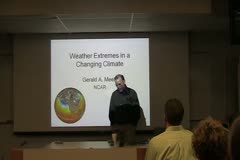
Weather extremes in a changing climate
April 15, 2010
Gerald Meehl (NCAR)
Hosted by Dave Randall
Weather extremes are reviewed in the context of behavior in present-Âday climate compared to climate change projections for the future. A relatively small shift in the average produces a very large change in extremes—more extreme heat and less extreme cold, and more record high maximum temperatures and fewer record low minimum temperatures. Global warming by itself doesn’t…
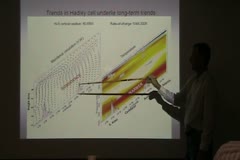
Aerosol properties and processes across Europe and their impacts: a multi-aircraft study during EUCAARI
April 08, 2010
Hugh Coe (Univ. of Manchester)
Hosted by Sonia Kreidenweis and Colette Heald
The EUCAARI project aims to advance our understanding of climate and air quality by integrating laboratory studies, both short and long term field investigations, satellite data, and modeling at regional and global scales. Airborne observations were used in an intensive study to provide a local and regional scale overview of the general composition trends of atmospheric aerosol over northern…
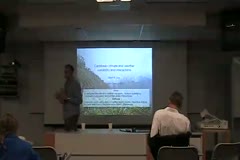
Caribbean climate, weather variability and interactions
April 01, 2010
Mark Jury (Univ. Puerto Rico Mayagüez)
Hosted by Eric Maloney
This study of hurricanes passing through the Caribbean in the period 1950–2005 reveals that seasons with more intense hurricanes occur with the onset of Pacific La Nina events and when Atlantic SSTs west of Africa are above normal. Composites of NCEP reanalysis fields w.r.t. Caribbean hurricanes reveal development of an anomalous equatorial Atlantic zonal overturning circulation (upper…
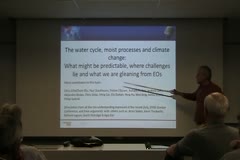
The Water Cycle, Moist Processes and Climate Change: What might be predictable, where challenges lie, and what we glean from new Earth observations
March 25, 2010
Graeme Stephens
Hosted by
The planet’s water cycle is thought to be ‘accelerating’ under the scenario of global warming with projected increases in the occurrence of heavier precipitation among other expected responses. The physical basis for these claims is not firmly advanced and this lack of firm basis, casts a large shadow on validity of projected changes in precipitation that appear in recent…
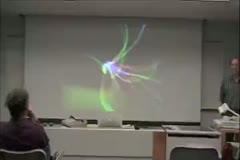
The space-time cascade structure of the atmosphere and its numerical models
March 04, 2010
Shaun Lovejoy (McGill Univ.)
Hosted by Philip Gabriel
In spite of the unprecedented quantity and quality of meteorological data and models, there is still no consensus about either the atmosphere’s or the models’ elementary statistical properties as functions of scale in either time or in space. We propose a new synthesis based on a) advances in the last 25 years in nonlinear dynamics, b) a critical reanalysis of empirical aircraft…
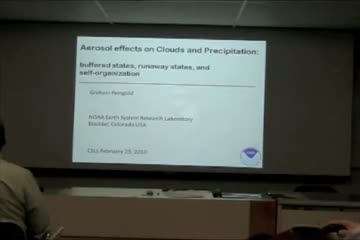
Aerosol effects on Clouds and Precipitation: Buffered states, runaway states, and self-organization
February 25, 2010
Graham Feingold
Hosted by Bill Cotton
It has been hypothesized that changes in the concentration of the aerosol can alter precipitation processes, change cloud lifetime and hence the radiative forcing of the climate system. Despite decades of research, it has proven frustratingly difficult to establish climatically meaningful relationships among aerosol, clouds, and precipitation. As a result the climatic effect of aerosol remains…
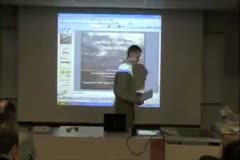
Low-level clouds and climate change
February 18, 2010
Amy Clement (Miami)
Hosted by Eric Maloney
Feedbacks involving low-level clouds remain a primary cause of uncertainty in global climate model projections. This issue is addressed by examining changes in low-level clouds over the NE Pacific in observations and climate models. Decadal fluctuations are identified in multiple, independent cloud datasets, and changes in cloud cover appear to be linked to changes in both local temperature…
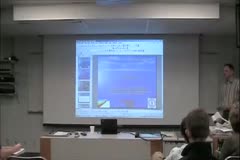
Probing the physics of environmental flows using numerical simulations
February 11, 2010
Karan Venayagamoorthy
Hosted by Eric Maloney
http://www.atmos.colostate.edu/dept/Abstract_SKV.pdf
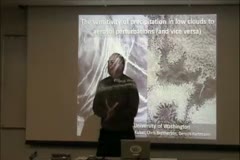
The sensitivity of precipitation in low clouds to aerosol perturbations
February 04, 2010
Robert Wood (UW)
Hosted by Jeff Collett
It is becoming apparent that even modest amounts of precipitation falling from low clouds can have a profound effect upon their coverage, thickness, and organization. It is therefore imperative that we understand the frequency and strength of precipitation produced by low clouds, together with the factors controlling it. Since Albrecht's seminal paper hypothesizing that polluted clouds may…
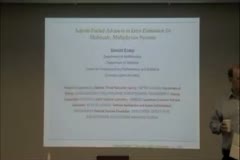
Adjoint-Fueled Advances in Error Estimation for Multiscale, Multiphysics Problems
January 28, 2010
Donald Estep (CSU)
Hosted by Dave Randall
The range of scales and complexity in multiscale, multiphysics systems means that obtaining accurate numerical simulations is extremely difficult. Consequently, there is an increasing - even strident - demand for quantification of error and uncertainty in model predictions. I will describe a powerful general approach for computing accurate estimates and the use of such estimates to mitigate the…
